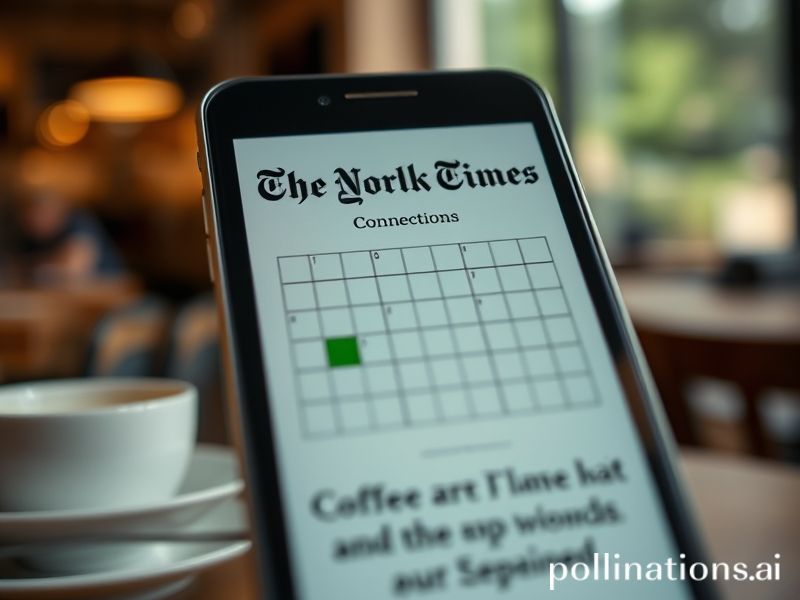Global Brains Sync at Midnight: How One NYT Puzzle Hint Unites—and Divides—the World on September 8
Connections Hint September 8: The Day the World Shared One Small Cheat Code
By Dave’s Locker International Desk
If you ask a diplomat in Brussels, a bond trader in Singapore, and a barista in Bogotá what they did at 00:01 UTC on 8 September, odds are all three will confess—after a conspiratorial glance over both shoulders—that they googled “connections hint september 8.” The New York Times’ gentle brain-scrambler has become the first truly global ritual since the last World Cup, only cheaper and with marginally less corruption.
Of course, the puzzle itself is trivial: sixteen words slouching in a grid, waiting to be herded into four tidy pens. Yet the hint that drops at midnight Eastern is the planetary equivalent of a starter’s pistol. Within minutes, a Cambodian tuk-tuk driver and a Norwegian pensioner are both muttering “Could ‘Bark’ fit with ‘Dog,’ or is that too obvious?” This is what passes for communion in 2024: not bread and wine, but mild lexical anxiety shared across 195 time zones.
The international implications are, naturally, absurd. South Korea’s K-pop agencies now track puzzle traffic to decide when to release teaser photos; if the servers groan under hint-seekers, the fandom is momentarily distracted and less likely to trend hashtags about contract disputes. Meanwhile, the EU’s Directorate-General for Competition has opened a preliminary inquiry into whether early spoilers constitute “unfair algorithmic advantage,” an investigation that will cost taxpayers €3.4 million and conclude sometime after the heat death of the universe.
In the Middle East, the puzzle has achieved the status of a minor UN negotiation tool. During last week’s cease-fire talks, aides noticed both Israeli and Hamas delegates surreptitiously refreshing the same hint page. A joint communique was drafted, then quietly shelved when neither side could agree whether “Rock, Paper, Scissors, Lizard, Spock” constituted a legitimate thematic category or cultural appropriation. Diplomats call it “soft power”; cynics call it procrastination with Wi-Fi.
The phenomenon has even infected global markets. Analysts at Deutsche Bank now publish a “Connections Sentiment Index,” tracking how long it takes the anglophone internet to solve the puzzle. A sub-three-minute average correlates with risk-on appetite; anything above eight minutes triggers a modest sell-off in futures, presumably because traders fear the populace is too demoralized to shop. It’s the financial equivalent of reading tea leaves, except the tea is lukewarm and comes with a paywall.
Developing nations, ever resourceful, have turned the hint drop into a cottage industry. In Lagos, enterprising teens screenshot the puzzle at 12:00 a.m. ET, solve it over breakfast, and sell annotated PDFs to commuters for the price of a meat pie. Call it trickle-down puzzlenomics. The World Bank, never one to miss a buzzword, is drafting a report titled “Gamified Cognitive Micro-Tasks as Subsistence Strategy,” which will be read by exactly seven people, three of whom will skim only the executive summary.
And yet, for all the geopolitical theater, the hint remains a tiny act of mercy. On a planet currently debating whether to reintroduce ration books and coal stoves, a six-letter nudge that “one group is things you can fold” feels almost tender. It’s the kind of small, shared delusion that keeps the lights on inside our skulls—like thinking the next election will fix everything, or that airplane mode actually prevents crashes.
So when the clock strikes midnight tonight, spare a thought for the 8 September hint as it wings its way across undersea cables and 5G towers, uniting humanity in a collective sigh of “Oh come on, that’s not a proper word.” It’s not world peace, but it’s cheaper than a summit, less lethal than a proxy war, and—unlike most international agreements—usually finished before breakfast. If that’s not progress, it’s at least a very small, very printable consolation prize.







